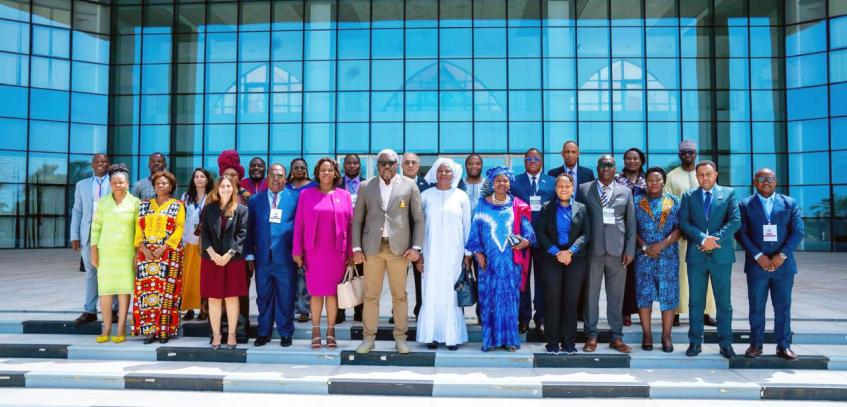In celebration of African Human Rights Day, the Pan African Parliament and key partners including the African Commission on Human and Peoples' Rights (ACHPR), and relevant United Nations agencies, co-hosted a high-level colloquium entitled “Realizing Economic, Social, and Cultural Rights in Africa, with a Focus on the Right to Education.” Held from 21 to 22 October 2024 in Banjul, The Gambia, on the sidelines of the 81st Ordinary Session of the ACHPR, the event coincided with the AU’s 2024 theme, “Educating an African Fit for the 21st Century.”
The colloquium brought together policymakers, human rights defenders, civil society leaders, academia, and representatives from national and regional bodies to discuss strategies for advancing inclusive and equitable education across Africa. The event highlighted the unique challenges faced by vulnerable groups, including girls, children with disabilities, refugees, and internally displaced persons, with a special focus on breaking the cycles of poverty and inequality through accessible education.
During the opening session, Hon. Jean Marie Nibirantije, Chairperson of the PAP Committee on Justice and Human Rights, reaffirmed PAP's commitment to inclusive education as a catalyst for economic growth. Referring to the Resolutions of the Third Ordinary Session of the Sixth Parliament, PAP.6/PLN/CECTHR/RECOM/01/JUN.24, he emphasized the need to invest in educational infrastructure, teacher training, and innovative financing mechanisms, while leveraging technology to reach underserved populations. “Inclusive education not only empowers individuals but transforms them into drivers of their communities’ economic resilience,” Hon. Nibirantije stated.
Through keynote addresses, academic papers, and panel discussions, participants reflected on the status of economic, social, and cultural rights (ESCR) in Africa, particularly in relation to education. Innovative solutions to strengthen education systems were explored, with a focus on human rights-based approaches to education policy. Other key themes of the colloquium included the right to education as a cornerstone of ESCR, challenges and best practices, and the vital role of legislatures in shaping education policy.
Under the theme “Empowering Africa's Future: The Pan-African Parliament’s Role in Advancing Inclusive Education and Economic Development,” Hon. Sen. Kouadio Kouakou Bertin, Chairperson of the PAP Committee on Education, Culture, Tourism and Human Rights moderated a panel discussion aimed at sparking transformational dialogue on tackling Africa’s persistent educational challenges. With over 21 million children still out of school and high dropout rates among vulnerable groups, the discussions underscored the urgency of achieving Sustainable Development Goal 4 (SDG 4)—ensuring inclusive, equitable, and quality education for all.
The Pan-African Parliament, alongside its partners, remains dedicated to working collaboratively to advance policies that ensure education is accessible, affordable, and of high quality—particularly for marginalized groups. Investing in inclusive education is not only a fundamental right but also a key driver of sustainable social and economic development.
The collaborative framework between the PAP and ACHPR recognizes, the Pan-African Parliament as the legislative arm of the African Union which plays a crucial role in promoting human rights, democracy, and good governance across the continent, while the ACHPR continues to deliver on its mandate of protecting and advancing human rights in Africa. The Joint Colloquium therefore stands as a testament to their shared commitment in this regard and of all stakeholders to realizing the right to education and building a brighter, more inclusive future for Africa.
END.








